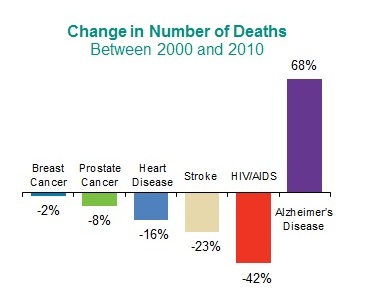|
Scientists believe we are at a tipping point on Alzheimer’s research. We have the ideas, the technology and the will. But we do not have a commitment from the federal government. Over the next 40 years, caring for individuals with Alzheimer’s will cost American society $20 trillion including $15 trillion to Medicare and Medicaid. For every $28,000 the federal government spends on care for Alzheimer’s disease patients, it only spends $100 on Alzheimer’s disease research. Federal funding of Alzheimer’s research is an inadequate $498 million, and does not reflect the escalating national epidemic of Alzheimer’s disease.
The Alzheimer’s Breakthrough Act would have required the Director of the National Institutes of Health (NIH) to accelerate the development of treatments that prevent, cure, or slow the progression of Alzheimer’s disease and reduce the financial burden of Alzheimer’s on federally funded programs and families. The bill required the director of NIH to develop a research plan to overcome Alzheimer’s disease and to make annual appropriations and budget requests to accomplish that plan. The Alzheimer’s Breakthrough Act (H.R. 1897) would have:
This legislation was not passed by Congress prior to the end of the 112th Congress. Stay tuned for more information regarding new legislation or reintroduction of legislation in the 113th Congress.
Resources:
If you have the opportunity to speak to a member of Congress about this legislation, please report it at: www.alz.org/congressionalreportform Learn about our other top legislative priority at: www.alz.org/hopeact
|
Alzheimer's Breakthrough Act

